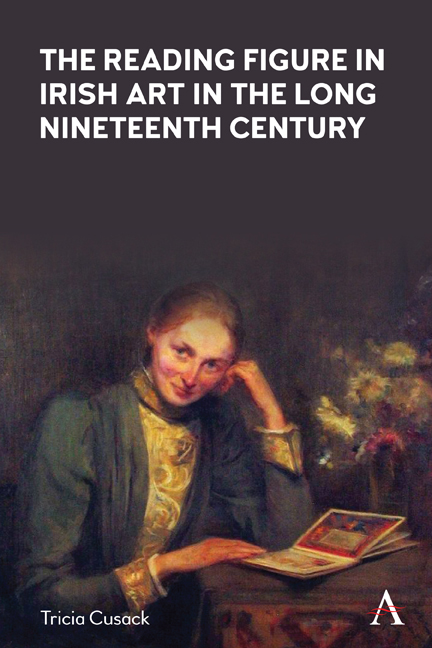Book contents
- Frontmatter
- Contents
- List of Figures
- Acknowledgements
- Introduction
- 1 Imperial Man, Manly Nationalism and the Unmanly Reader
- 2 ‘Creatures of a Different Breed’: Women Readers and Patriarchal Discourse
- 3 The Shaping of the New Woman in Ireland
- 4 The Silent Reader and the Fictive Viewer
- 5 A Room of Her Own: Four New Women in Dublin
- Conclusion
- Notes
- Works Referenced
- Index
2 - ‘Creatures of a Different Breed’: Women Readers and Patriarchal Discourse
Published online by Cambridge University Press: 27 April 2022
- Frontmatter
- Contents
- List of Figures
- Acknowledgements
- Introduction
- 1 Imperial Man, Manly Nationalism and the Unmanly Reader
- 2 ‘Creatures of a Different Breed’: Women Readers and Patriarchal Discourse
- 3 The Shaping of the New Woman in Ireland
- 4 The Silent Reader and the Fictive Viewer
- 5 A Room of Her Own: Four New Women in Dublin
- Conclusion
- Notes
- Works Referenced
- Index
Summary
Women who aspired to intellectual or creative work in this period, whether as independent readers, artists or novelists, were subject to the constraints of the powerful gender discourses common to Ireland, Britain and elsewhere. Art participated in the array of dominant discourses that tended to undermine women's physical and intellectual abilities. This chapter discusses the nature and prevalence of patriarchal ideology in relation to the representation of women readers. Many European and American images of a woman reader, generally by male artists, do not focus on a woman engaged in reading but on a female figure designed for the purpose of pleasing a male gaze. This chapter examines paintings of women readers from Britain, France and elsewhere in which books function as accessories to displays of the female form, whether semi-clothed or elaborately garbed. These images are compared to similar but less ostentatious Irish depictions of women readers, for instance, by John Lavery. This examination presents a standard against which the distinctiveness of the Irish portraits of women readers, mostly by women artists, might be measured.
‘Creatures of a different breed’
The French philosopher Michel Foucault argued that sexuality in the Victorian period was a constant focus of discourse. The dominant view was that as a result of their peculiar biology, women were inherently weak, psychologically unstable and unable to engage in intellectual work. This ideology was promulgated through a wide range of contributory discourses and outlets – medical, religious, evolutionary, literary and artistic – that largely emanated from male-dominated institutions and publications. As Foucault commented, ‘sex was not something one simply judged; it was a thing one administered […] it called for management procedures’.
In medical discourse, for instance, women were characterised as frail, their female functions liable to disturbance by serious intellectual work. Foucault spoke of ‘a hysterization of women's bodies […] the Mother, with her negative image of “nervous woman” constituted the most visible form of this hysterization’. Women have been commonly stereotyped in patriarchal ideology as over-emotional, while men have been characterised as rational. This had far-reaching consequences for women's status because as R. W. Connell suggests, ‘hegemonic masculinity establishes its hegemony partly by its claim to embody the power of reason, and thus represent the interests of the whole society’.
- Type
- Chapter
- Information
- Publisher: Anthem PressPrint publication year: 2022



